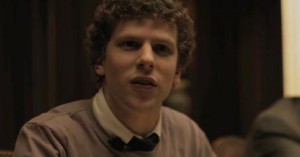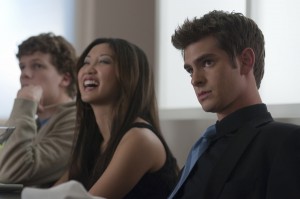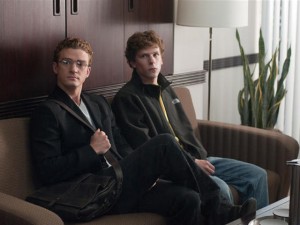The Social Network
 Do casting directors have a better sense of irony than previously thought? Obviously, that’s a nugget that hovers over all of us daily, overtaking our will until we can think of nothing else, but how else to explain the casting of Justin Timberlake as Napster co-founder Sean Parker in David Fincher’s The Social Network?
Do casting directors have a better sense of irony than previously thought? Obviously, that’s a nugget that hovers over all of us daily, overtaking our will until we can think of nothing else, but how else to explain the casting of Justin Timberlake as Napster co-founder Sean Parker in David Fincher’s The Social Network?
Napster’s heyday, 1999-2001, coincided with Timberlake’s major success in the boy band ‘N Sync; they were their most popular from 1998-2001. ‘N Sync produced music that could be complimentarily called disposable, exactly the kind of popular material that Napster thrived on. Would Timberlake’s pockets have been hurt by the illegal downloading provided by Napster? No doubt about it and it probably gave Timberlake extra zeal in portraying Parker, who weaseled his way into being one of the main decision makers at Facebook, as a spectacularly narcissistic and shallow opportunist.
 Timberlake isn’t the only villain in The Social Network, the arrogant and casually sociopathic central figure in the film is Facebook founder Mark Zuckerberg, snivelingly played by Jesse Eisenberg. Fincher’s approach to the socially significant creation that validated the lonely lives of a nation is to shoot it like he made Fight Club (even re-using the CGI breath that was originally left over from Titanic), a surreal dream of financial waste and delusion covered in a deep green and brown color scheme. The HD photography (the movie was shot on The RED camera) is incredibly sharp and crisp, as clean looking and carefully framed as any movie I can remember.
Timberlake isn’t the only villain in The Social Network, the arrogant and casually sociopathic central figure in the film is Facebook founder Mark Zuckerberg, snivelingly played by Jesse Eisenberg. Fincher’s approach to the socially significant creation that validated the lonely lives of a nation is to shoot it like he made Fight Club (even re-using the CGI breath that was originally left over from Titanic), a surreal dream of financial waste and delusion covered in a deep green and brown color scheme. The HD photography (the movie was shot on The RED camera) is incredibly sharp and crisp, as clean looking and carefully framed as any movie I can remember.
 All of this visual clarity is aided by Aaron Sorkin’s script, which features his usual chattery screwball comedy dialogue (“They shot The Towering Inferno here.” “That’s comforting.”), blurted out at a manic pace (think Sorkin’s TV show Sports Night). This results in an enormous amount of information being laid out for the viewer, via flashback, flash forward, amidst lawsuits filed against Zuckerberg by twin fratboys* (“I’m 6’5, 220 and there’s two of us”) he deems beneath him or best friends whom he betrayed (Andrew Garfield, playing Facebook financier Eduardo Saverin like a young-Alan Arkin). The fact that The Social Network is not a three hour epic is a miracle; it’s one of the best edited studio features since Silence of the Lambs, which was the most compact novel adaptation of its time.
All of this visual clarity is aided by Aaron Sorkin’s script, which features his usual chattery screwball comedy dialogue (“They shot The Towering Inferno here.” “That’s comforting.”), blurted out at a manic pace (think Sorkin’s TV show Sports Night). This results in an enormous amount of information being laid out for the viewer, via flashback, flash forward, amidst lawsuits filed against Zuckerberg by twin fratboys* (“I’m 6’5, 220 and there’s two of us”) he deems beneath him or best friends whom he betrayed (Andrew Garfield, playing Facebook financier Eduardo Saverin like a young-Alan Arkin). The fact that The Social Network is not a three hour epic is a miracle; it’s one of the best edited studio features since Silence of the Lambs, which was the most compact novel adaptation of its time.
And it’s a shame that this thorough, theoretically important film is hampered by a concession to the marketplace. The Social Network is a film about bored smart people who want to be accepted by nerd culture** and create and manipulate a world they think they can control, amongst many, many other complicated contradictions. In other words, this is a film for adults, and the PG-13 rating hampers the film immensely. Overdubbing profanity, cutting around the drug use, sex, and copious underage drinking don’t make these things go away, and seeing as Zuckerberg himself was inspired because of a lonely drunken night, there’s no reason to water the film down. What ended up happening is that the film is now packed to the gills with hints at naughty material, instead of a little breathing room to develop some of its themes, rendering the movie much shallower than Sorkin’s script suggests.
 Besides, the best films about high school students are R rated (Election, Rushmore, Rocket Science), because they don’t pretend teenagers are saints, and that they don’t curse or have sex. Seeing as The Social Network is about college students in over their head, how would 13 year-olds who’ve been sheltered from all of the evil things society has to offer relate to the film as anything other than a presentation of the origins of Facebook, as opposed to what the film is, a sharp satire of those who can reduce their lives to who they have on their friends list or whether or not they list themselves as single?***
Besides, the best films about high school students are R rated (Election, Rushmore, Rocket Science), because they don’t pretend teenagers are saints, and that they don’t curse or have sex. Seeing as The Social Network is about college students in over their head, how would 13 year-olds who’ve been sheltered from all of the evil things society has to offer relate to the film as anything other than a presentation of the origins of Facebook, as opposed to what the film is, a sharp satire of those who can reduce their lives to who they have on their friends list or whether or not they list themselves as single?***
* These privileged Aryan Harvard fratboys are self-aware enough to sense that they are clichés, they even reference chasing the Jewish Zuckerberg around as would “look like they’re dressed in skeleton costumes and chasing The Karate Kid around the High School gym.” Shame ‘80s movie brute stalwart William Zabka wasn’t asked to cameo.
 ** Comedian Marc Maron used to sell “Nerdcock” t-shirts to support his WTF!? Podcast. They were eventually scrapped for not selling well, probably because it required so much explanation as to what “Nerdcock” was. Though it seems obvious, the term was supposed to reflect the changing of the guard from “CockRock” fratboy world dominance to Nerd world dominance, and a social acceptance of gadgetry and obsession of minutia. The Social Network is Nerdcock central.
** Comedian Marc Maron used to sell “Nerdcock” t-shirts to support his WTF!? Podcast. They were eventually scrapped for not selling well, probably because it required so much explanation as to what “Nerdcock” was. Though it seems obvious, the term was supposed to reflect the changing of the guard from “CockRock” fratboy world dominance to Nerd world dominance, and a social acceptance of gadgetry and obsession of minutia. The Social Network is Nerdcock central.
*** Not to mention the fact that Facebook was started by someone as anti-social and focused on data (instead of people) as Zuckerberg. In the very first scene of the film he says, “I don’t need friends.”



